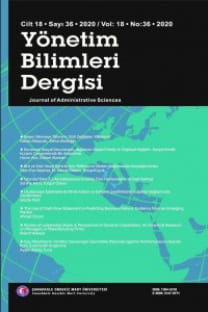MUTLU ÇALIŞANLAR İÇİN ÖNCELİKLİ YÖNETİCİ ERDEMLERİ: BİR SAHA ARAŞTIRMASI
A Field Research on Priority Managers Virtues for Happy Employee
___
- Adorno, T. E. (1973). The jargon of authenticity, K. Tarkowski, I. Will (Trans.), Evanston, IL: Northwestern University Press.
- Alparslan, Ali M., Yastıoğlu, S. & Taş, M. A. (2017, Kasım). İşgörenleri mutlu eden yönetici davranışlarını belirlemeye yönelik bir araştırmas. 5. Örgütsel Davranış Kongresi, Antalya.
- Alparslan, Ali M., Yastıoğlu, S. (2017, Eylül). İşgörenleri mutlu eden geribildirim özelliklerini belirlemeye yönelik bir saha araştırması. International Congress on Management Economics and Business, Zonguldak.
- Bennis W. G., Thomas, R. J., (2002). Crucibles of Leadership. Harvard Business Review, p. 152.
- Bennis, W., Nanus, B. (2007). Leaders: Strategies for taking charge (2nd ed.). New York: Harper-Collins.
- Caldwell, C., Bischoff, S.J., Karri, R. (2002). The four umpires: a paradigm for ethical leadership. Journal of Business Ethics, Vol. 36, No. 12, p. 53-163.
- Caldwell, C., Hasan, Z., Smith, S. (2015). Virtuous leadership–insights for the 21st century. Journal of Management Development, Vol. 34, No. 9, p. 1181-1200.
- Caldwell, C., Hayes, L.A., Karri, R., Bernal, P. (2008). Ethical stewardship: implications for leadership and trust. Journal of Business Ethics, Vol. 78 No. 1/2, p. 153-164.
- Cameron, K. (2011). Responsible leadership as virtuous leadership. Journal of Business Ethics, Vol. 98, No. 1, p. 25-35.
- Carr, A. (2016). Pozitif psikoloji (Çev. Ü. Şendilek ). İstanbul: Kaknüs Yayıncılık.
- Cevizci, A. (2002). Etiğe giriş. İstanbul: Paradigma Yayınları.
- Choi, Y., Mai-Dalton, R. R. (1999). The model of followers’ responses to self-sacrificial leadership: An empirical test. The Leadership Quarterly, Vol. 10, No. 3, p. 397-421.
- Covey, S.R., Merrill, A.R., Merrill, R.R. (1999). First things first: To live, to love, to learn, and to leave a legacy. New York: Simon & Schuster.
- Durak, N. (2009). Platon ve Fârâbî felsefesinde erdem kavramı. Isparta: Fakülte Yayınevi.
- Gini, A., Green, R. M. (2013). 10 Virtues of Outstanding Leaders: Leadership and Character (Vol. 5). John Wiley & Sons.
- Hackett, R. D., Wang, G. (2012). Virtues and leadership: An integrating conceptual framework founded in Aristotelian and Confucian perspectives on virtues. Management Decision, Vol. 50, No. 5, p. 868-899.
- Hernandez, M. (2008). Promoting stewardship behavior in rganizations: a leadership model. Journal of Business Ethics, Vol. 1, p. 121-128
- Kaufmann, E. (2016). The Four Virtues of a Leader: Navigating the Hero’s Journey Through Risk to Results. Colorado: Sounds True.
- Lord, R. G., Foti, R. J. (1986). Schema theories, information processing, and organizational behavior. The thinking organization, p 20-48.
- Miskeveyh, İ. (1983). Ahlakı olgunlaştırma. çev. Abdulkadir Şener-İsmet Kayaoğlu-Cihad Tunç. Ankara: Kültür ve Turizm Bakanlığı Yayınları.
- Paine, L. S. (2003). Value shift: Why companies must shift social and financial ımperatives to achieve superior performance. New York: McGraw-Hill.
- Pearce, C. L., Waldman, D. A., Csikszentmihalyi, M. (2006). Virtuous leadership: A theoretical model and research agenda. In The Virtuous Organization: Insights from Some of the World’s Leading Management Thinkers, p. 211-230.
- Peterson, C., Seligman, M. E. (2004). Character strengths and virtues: A handbook and classification. Oxford University Press.
- Pink, D. H. (2006). A whole new mind: Why right-brainers will rule the future. Penguin.
- Riggio, R. E., Zhu, W., Reina, C.,Maroosis, J. A. (2010). Virtue-based measurement of ethical leadership: The Leadership Virtues Questionnaire. Consulting Psychology Journal: Practice and Research, Vol. 62, No. 4, p. 235.
- Sarıcı, D. (2015). Öğretmenlerin iş doyumu ile pozitif psikolojik sermaye düzeylerine yönelik görüşleri (İzmir-Foça ilçesi örneği). Yüksek lisans tezi. Abant İzzet Baysal Üniversitesi, Eğitim Bilimleri Enstitüsü. (415910).
- Seligman, M. E. (2007). Coaching and positive psychology. Australian Psychologist, Vol. 42, No. 4, p. 266-267.
- Senge, P. (2006). The fifth discipline: The art and practice of the learning organization. New York: Doubleday.
- Sexton, T. (2007). Review of Research Literature on Authentic Leadership. England, Creative Edge Consulting Limited.
- Sheldon, K. M., King, L. (2001). Why positive psychology is necessary. American psychologist, 56(3), 216.
- Verbraak, K. Transformational leadership and employee well-being: The rol of trust in leader, Tilburg University, http://arno.uvt.nl/show.cgi?fid=135244.
- Yorges, S. L., Weiss, H. M., Strickland, O. J. (1999). The effect of leader outcomes on influence, attributions, and perceptions of charisma. Journal of Applied Psychology, Vol. 84, No. 3, p. 428.
- ISSN: 1304-5318
- Yayın Aralığı: 4
- Başlangıç: 2003
- Yayıncı: Yönetim Bilimleri Dergisi
KENTLEŞME SORUNLARI KAPSAMINDA ŞANLIURFA’NIN ÇEVRE SORUNLARI VE ÇÖZÜM ÖNERİLERİ
Hale BİRİCİKOĞLU, Yasemin YALNIZOĞLU
YÜKSEKÖĞRETİM ÖĞRENCİLERİNİN YAŞAM KALİTESİNE YÖNELİK ALGILARI: ÇOMÜ ÖRNEĞİ
Dilek KEKEÇ MORKOÇ, Cumhur ERDÖNMEZ
İSTİKRAR VE GÜVENİN TÜKETİCİ KREDİLERİ ÜZERİNDEKİ ETKİSİ: TÜRKİYE İÇİN ZAMAN SERİSİ ANALİZİ
TÜRKİYE’DE FORDİST ÜRETİM KRİZİNİN ORTAM KOŞULLARI BAĞLAMINDA İNCELENMESİ
OSMANLI DEVLETİʼNDE VAKIF YÖNETİMİNDE TEVLİYET: İSTANBUL ÖRNEĞİ
2012 YENİ TEŞVİK YASASI ÖNCESİNDE VE SONRASINDA DİYARBAKIR’DA ÖZEL YATIRIMLAR
Bahar BURTAN DOĞAN, Bahar BURTAN DOĞAN
